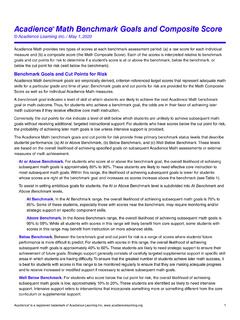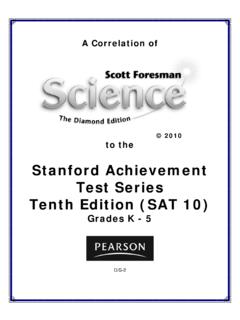Transcription of Case Study: Interventions for an ADHD Student Nicholas ...
1 Case Study: Interventions 1. Running head: RESPONSE TO Interventions . Case Study: Interventions for an ADHD Student Nicholas Daniel Hartlep Publication/Creation Date: August 10, 2009. Case Study: Interventions 2. ABSTRACT. This case study was done in partial fulfillment of a Master of Science in Education ( ) Graduate Course the participant-observer was completing. The participant- observer learned a lot about Dmitrov, the child in this study. Dmitrov was a 2nd-grade Student who was diagnosed (late in the school year) with Attention Deficit Hyperactivity Disorder (ADHD). The participant-observer's final recommendations are as follows: (1).
2 For this particular child to continue medication (Concerta) and (2) work to find the optimal dosage of Concerta for this child when he reaches 3rd-grade. Case Study: Interventions 3. Case Study: Interventions for an ADHD Student This case-study is based on one of my 2nd-grade students. Pseudonyms have been used to maintain anonymity. On Saturday, January 26, 2008 I called Mr. and Mrs. Petrenko's residence via telephone. I spoke to Mrs. Petrenko and outlined the study by reading to her the permission slip verbatim. She happily agreed to allow me to research her child. I told her I would send her husband and her the permission slip in the postal mail.
3 On the phone Mrs. Petrenko told me she was happy I called, because today Dmitrov started on Concerta. Concerta is a central nervous system stimulant. It affects chemicals in the brain and nerves that contribute to hyperactivity and impulse control. Concerta is medication used to treat attention deficit disorder (ADD), attention deficit hyperactivity disorder (ADHD), and narcolepsy. Previously I had tracked Dmitrov's interruptions in class (See Appendix A). Mrs. Petrenko asked me to resume monitoring Dmitrov's outbursts beginning Monday, January 28, 2008 (See Appendix B). I agreed. Mrs. Petrenko also indicated that her son was taking the lowest dosage, milligrams (mg).
4 She also informed me that Dmitrov's appetite may be suppressed in the early stages of using the medicine. She told me she was not worried because [ ] he (Dmitrov) is on the heavier side, and we eat square balanced meals at home.. On Saturday, January 26, 2008, I sent Mr. and Mrs. Petrenko the permission slip in a manila envelope. The contents of the manila envelope were as follows: (1) a return self-addressed-stamped-envelope and (2) two copies of the permission slip. On Thursday, January 31, 2008 it was returned to me at school. A. OBJECTIVE DATA. Child's name: Dmitrov Andrei Petrenko Date of Birth: June 3, 2000 @ 10:42 (5 weeks premature).
5 Age at Beginning of Study: As of January 26, 2008, Dmitrov is 2793 days-old. In year- months he is years-old (See Appendix C). Other relevant information: Dmitrov was the first born (5 weeks premature); he has a younger sister, Katya Sasha Petrenko (age 4). During Dmitrov's first week of life he stayed in the hospital due to Jaundice. Dmitrov had too much bilirubin (pronounced Billy Ruben) in his blood and low oxygen. At the hospital the doctors used blow-by oxygen to help him. School grade at beginning of study: 2nd-grade Test Data stanford achievement Test, Tenth edition (See Appendix D). Grade: 02 ---- October, 2007. Total Reading NPR: 25.
6 Word Study Skills NPR: 35. Word Reading NPR: 16. Sentence Reading NPR: 13. Comprehension NPR: 44. Case Study: Interventions 4. Total Mathematics NPR: 12. Problem Solving NPR: 06. Procedures NPR: 35. Language NPR: 42. Spelling NPR: 11. Environment NPR: 63. Evaluation: 3/5 of Dmitrov's scores fall Below Grade Level range; those being Reading, Spelling, and Mathematics, while 2/5 of Dmitrov's scores are in the At Grade Level range; those being Language and Environment. Due to a variety of factors including his attitude and physical condition on the day of testing, the scores on this report are only an estimate of his actual performance.
7 PRACTICE District Math Test Grade 02. April 07, 2008 Date Administered: April 7, 2008. Percent Correct 88%. Problems Correct 23/26. Dynamic Indicator of Basic Early Literacy Skills (DIBELS). October, 2005. Dynamic Indicators of Basic Early Literacy Skills (DIBELS) is a test designed to measure and monitor pre-reading and early reading skills. Nonsense Word Fluency (NWF) measures a Student 's ability to read short, one-syllable words and understand letter-sound relationships. Oral Reading Fluency (ORF) measures the number of words a child can read correctly in one minute. Letter Naming Fluency Score: 42/37 Status: Low Risk Phoneme Segmentation Fluency Score: 53/35 Status: Established Nonsense Word Fluency Score: 17/24 Status: Some Risk February, 2006.
8 Phoneme Segmentation Fluency Score: 65/35 Status: Established Nonsense Word Fluency Score: 55/50 Status: Established Oral Reading Fluency Score: 10/20 Status: Some Risk Retell Fluency Score: 0 Percent of ORF: 0%. May, 2006. Phoneme Segmentation Fluency Score: 68/34 Status: Established Nonsense Word Fluency Score: 47/50 Status: Emerging Oral Reading Fluency Score: 37/40 Status: Some Risk Retell Fluency Score: 24 Percent of ORF: 65%. First-grade Running Records September, 2005. Reading Recovery Running Record Score: 3. November, 2005. Case Study: Interventions 5. Reading Recovery Running Record Score: 5. January, 2006. Reading Recovery Running Record Score: 12.
9 March, 2006. Rigby Running Record Score: 16. May, 2006. Rigby Running Record Score: 18. By looking carefully at Dmitrov's scores, I speculate that he has made slight progress from year to year. However, he is still not achieving at the rate of his peers in the areas of reading, language arts, and writing. B. REASONS FOR REFERRAL. Dmitrov, at times, appears to lack self-awareness and self-control. The beginning of the year was a difficult adjustment. Dmitrov needs to work on not blurting out in class and showing more self-control. Dmitrov's behavior in the classroom is sometimes disruptive to others around him. His behavior negatively impacts his own learning.
10 He fidgets with items in his desk and is distracted easily. Many times I observe him and he is not paying- attention to what I am doing in the front of the classroom. I have moved his seat closer to me; however, to no avail, he continues to appear unfocussed. Although I am concerned about Dmitrov, I enjoy his curiosity and having him in my class very much. Dmitrov is a kind and caring boy. Dmitrov has the capacity to work hard if he wants to and/or is interested in the activity. In small-group settings and 1:1 with me, he appears to understand; however, if he is void of this 1:1 attention, he will rush through work and produce low-quality work.











